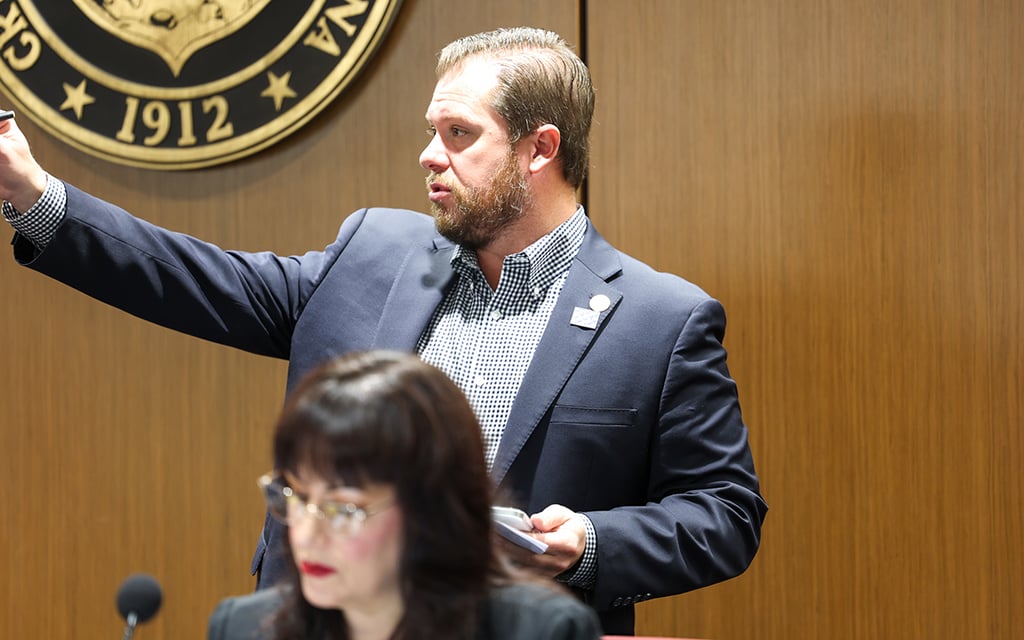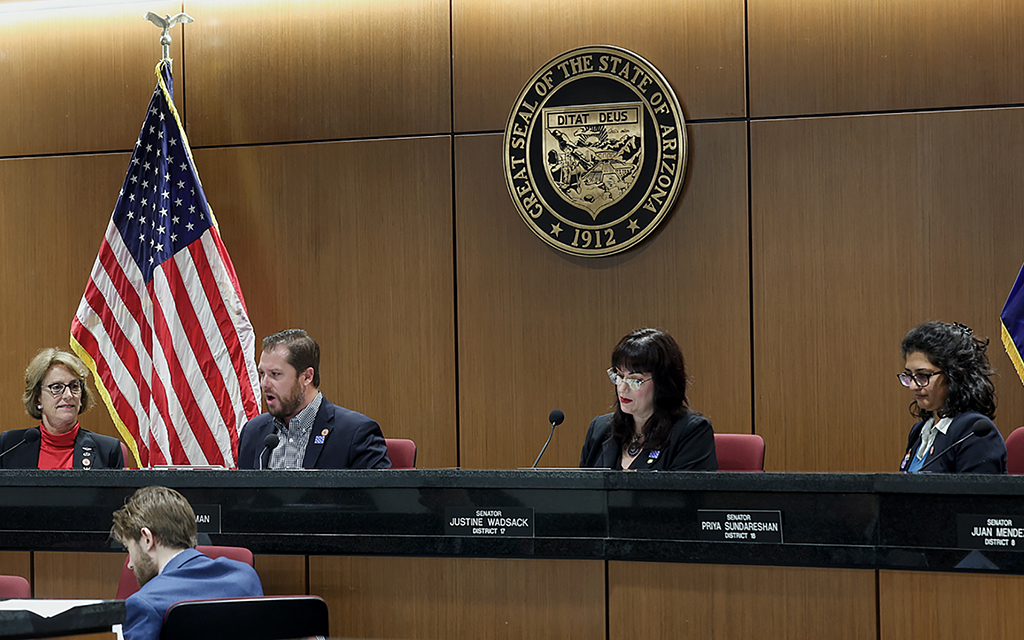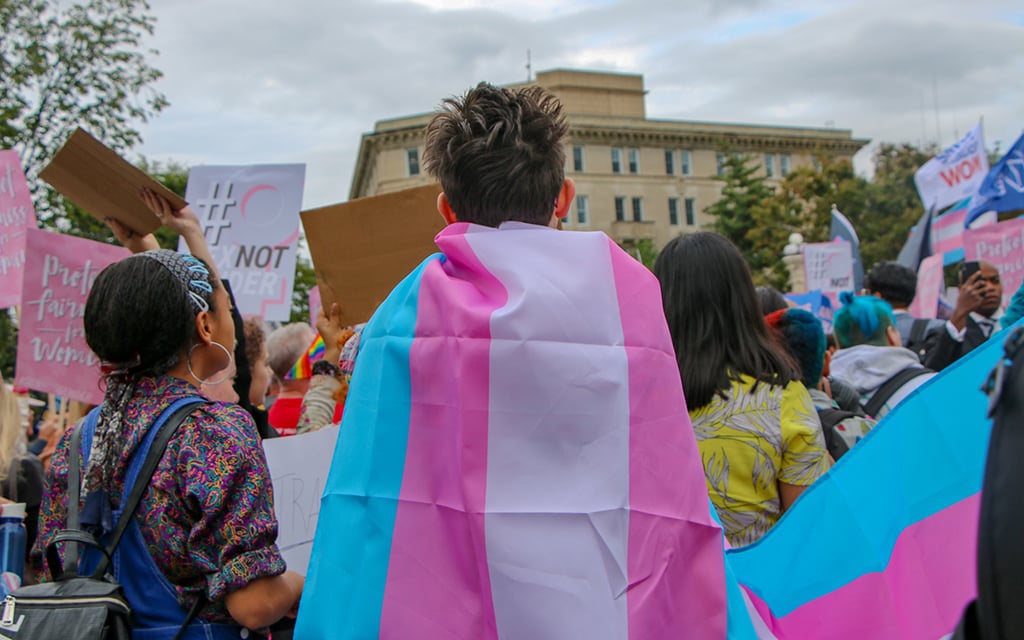
Sen. Jake Hoffman, R-Queen Creek, talks about his bill that would ban the use of diversity, equity and inclusion programs at state-funded institutions and prohibit contracts with companies that engage in such programs. (Photo by Harris Hicks/Cronkite News)
PHOENIX – Republican legislators are trying again to ban diversity, equity and inclusion efforts at institutions that receive state funds, saying it “divides communities and dehumanizes human beings.”
Supporters argued just the opposite during the Senate Government Committee hearing, saying DEI promotes inclusion in agencies and that for businesses it can “actually promote their financial interests and bottom lines.”
Wednesday’s hearing marks the second attempt by Sen. Jake Hoffman, R-Queen Creek, to ban DEI programs. A similar bill passed the Senate last year died in the House.
“It is a bad practice and especially with public monies, this is something that we should not be doing,” Hoffman said.
Hoffman’s bill would prevent public entities from requiring DEI training, organizing DEI programs or retaining employees specifically to advance DEI initiatives. It would allow workers to sue their employer if they were forced to participate in such a program, and would ban state contracts with any private company that participates in a DEI program.
The consulting firm McKinsey and Co. defines diversity, equity and inclusion as values used by organizations that want to support different groups of individuals, including people of different races, ethnicities, religions, abilities, genders and sexual orientations.
But the bill says DEI programs are those that base power and privilege on race, gender, ethnicity, sexual and gender orientation, among other factors, describe methods to dismantle those power structures and justify differential treatment based on those factors. It also cites more than 20 “theories of unconscious or implicit bias,” including cultural appropriation, systemic oppression, inclusive language and more.
Sen. Priya Sundareshan, D-Tucson, opposed Hoffman’s bill, saying said DEI is not a threat to public entities, but often an asset.
“These are all concepts that, in the business world, have been found to actually promote their financial interests and bottom lines by being inclusive of ideas and experiences that were formerly sidelined,” Sundareshan said at the hearing.
Sen. Wendy Rogers, R-Flagstaff, disagreed, pointing to airlines’ use of DEI programs. While it “supposedly helps a company financially, it compromises public safety,” she said.
Sundareshan cited a viral thread on X, formerly known as Twitter, from businessman and Dallas Mavericks owner Mark Cuban, who said DEI efforts benefit companies and give them an edge over competitors.
Hoffman called it “comical” to cite Cuban as an expert on DEI, pointing to a post from X owner Elon Musk in response.
“I’ll wait for (Cuban) to hire a short white person or a short Asian person for his NBA team and then he can speak on it,” Hoffman said, parroting Musk’s tweet at the hearing.
Hoffman referenced a WebMD survey, saying “62% of workers surveyed say DEI programs aren’t effective and nearly half said programs have failed them personally.” But the survey also said that nearly half of employees who responded said the problem was not DEI itself but that their companies were not following through with the programs.
Under Hoffman’s bill, public universities and community colleges in the state would have to end DEI programs. Arizona universities stopped asking job applicants to provide statements on their commitment to DEI last year, after the U.S. Supreme Court rejected race-based college admission policies.

Sen. Priya Sundareshan, D-Tucson, right, said DEI programs are an asset to public institutions, not a threat. But her arguments failed to stop a bill to block such programs at state agencies. It passed the Senate Government Committee 5-3. (Photo by Harris Hicks/Cronkite News)
The schools did not specifically cite the court’s ruling for their action, and officials from Northern Arizona University and Arizona State University did not respond to requests for comment Wednesday. A spokesperson for the University of Arizona declined to speak on pending legislation.
Tyler Kowch, a spokesperson for Save Our Schools Arizona, said in an emailed statement that DEI programs help public school teachers and students “harness the differences, talents, and unique qualities of all individuals.”
“The attempts to ban these programs are based on the same nonsense, culture-war grievances we have seen materialize over the last four years in attempts to discredit our public schools,” Kowch said.
Fountain Hills Councilmember Allen Skillicorn was the only witness to give public comment on the bill and urged lawmakers to pass it.
“There’s a sharp contrast to what we’re talking about here today in DEI and merit and excellence and the contrast is that equity does not equal excellence, equity does not equal equality,” Skillicorn said.
The DEI bill was just one of several Wednesday aimed at reining in social initiatives. Others would prohibit banks, insurers and credit agencies from basing decisions on a customer’s political leanings and another would require the state to base investment decisions on financial factors only and not on a company’s environmental, social or governmental policies.
The committee passed the DEI bill 5-3 and sent it to the full Senate. Even if it passes the Senate and the House, however, it would likely face a veto by Gov. Katie Hobbs, a Democrat.


